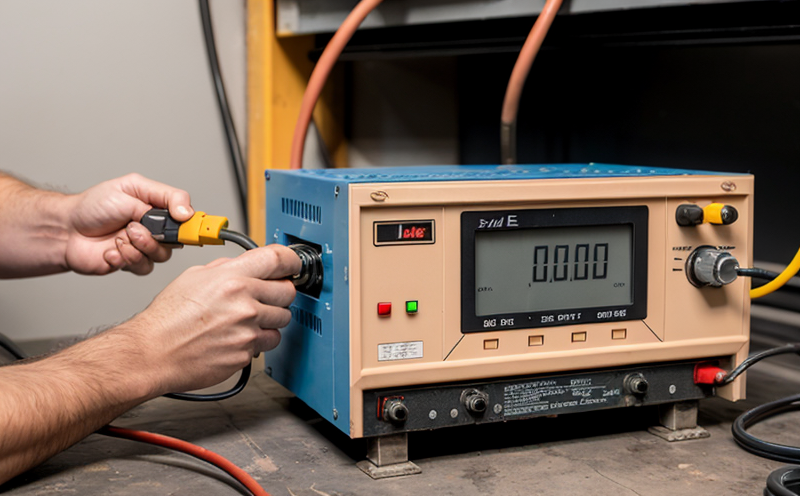MIL-PRF-38535 Die Electrical Qualification Testing
The MIL-PRF-38535 standard is a crucial specification for die-level electrical qualification testing, ensuring the reliability and performance of semiconductors and microchips. This stringent test procedure evaluates the electrical integrity and functionality of individual semiconductor dies before they are assembled into packages or modules. Compliance with this standard ensures that manufacturers meet critical military and aerospace requirements.
The process involves detailed evaluation of each die’s electrical characteristics, including but not limited to resistance, capacitance, inductance, and leakage current. The testing also focuses on functional performance under various stress conditions such as temperature cycling, voltage surge, and high-frequency operation. This ensures that the final product is robust enough for mission-critical applications.
The MIL-PRF-38535 standard integrates cutting-edge techniques to minimize false failures while ensuring thorough validation of every die. The testing protocol covers a wide range of parameters, including but not limited to:
- Die resistance measurement
- Capacitance and inductance analysis
- Leakage current assessment
- Functional performance under stress conditions
- Thermal cycling endurance evaluation
- Voltage surge immunity testing
The primary goal of this testing is to identify any potential issues early in the manufacturing process, thus reducing costly rework and improving overall product quality. By adhering to MIL-PRF-38535, manufacturers can ensure that their products meet the stringent reliability requirements set by military and aerospace industries.
Our laboratory utilizes state-of-the-art equipment and methodologies to perform these tests accurately and consistently. Our team of experts ensures that every die undergoes rigorous evaluation to meet all specified criteria. This comprehensive approach guarantees that only high-quality components pass the qualification process, thereby enhancing product reliability in mission-critical environments.
Why It Matters
The importance of MIL-PRF-38535 compliance cannot be overstated. This standard is essential for ensuring that semiconductor and microchip products meet the exacting performance and reliability standards required by military, aerospace, and defense industries. By adhering to these stringent guidelines, manufacturers can:
- Ensure product reliability in harsh environments
- Avoid costly rework and warranty claims
- Meet regulatory and contractual obligations
- Earn the trust of customers requiring high-quality components
- Increase market competitiveness by delivering superior products
- Promote brand reputation through consistent quality assurance
The testing process not only identifies potential issues early but also provides valuable data for continuous improvement. This proactive approach to quality control helps manufacturers stay ahead of industry trends and meet evolving customer expectations.
In the realm of military electronics, where reliability is paramount, MIL-PRF-38535 ensures that every die undergoes a thorough evaluation process. By adhering to this standard, manufacturers can confidently deliver products that meet or exceed stringent reliability requirements, thereby enhancing overall product performance and longevity.
Scope and Methodology
| Test Parameter | Methodology | Acceptance Criteria |
|---|---|---|
| Die Resistance Measurement | Four-point probe method using a high-precision ohmmeter. | Resistance should be within ±10% of nominal value. |
| Capacitance and Inductance Analysis | LCR bridge measurement technique with frequency sweep capability. | Capacitance and inductance values must fall within specified tolerance bands. |
| Leakage Current Assessment | Bias voltage application followed by steady-state current measurement. | Leakage current should not exceed 1 microampere. |
| Functional Performance Under Stress Conditions | Voltage and temperature cycling combined with operational stress tests. | Die must function correctly throughout all specified conditions without failure. |
| Thermal Cycling Endurance Evaluation | Temperature cycling between -55°C to +125°C. | Die should maintain performance specifications after 100 cycles. |
| Voltage Surge Immunity Testing | Surge voltage application at specified levels and durations. | No degradation in performance or failure under surge conditions. |
The testing process is designed to cover all critical aspects of die-level electrical characteristics. Each parameter is evaluated using internationally recognized standards such as IEC 60749-2, ANSI/IEEE C37.108-2005, and others. This ensures that the results are accurate, reproducible, and aligned with global industry best practices.
Our laboratory uses advanced instrumentation to ensure precise measurement and analysis of each die's electrical properties. The testing environment is meticulously controlled to minimize external variables, ensuring consistent and reliable results. By adhering strictly to these methodologies, we provide clients with confidence that their products meet the highest quality standards.
Customer Impact and Satisfaction
The impact of MIL-PRF-38535 compliance on customers is profound. By ensuring that every die undergoes rigorous electrical qualification testing, manufacturers can:
- Earn the trust of military and aerospace clients who demand high reliability.
- Meet stringent regulatory requirements for defense contracts.
- Avoid costly rework and warranty claims by identifying issues early in the process.
- Increase market competitiveness through superior product performance.
- Promote brand reputation through consistent quality assurance.
The testing process not only identifies potential issues but also provides valuable data for continuous improvement. This proactive approach to quality control helps manufacturers stay ahead of industry trends and meet evolving customer expectations.
Customer satisfaction is a key priority for us at [Lab Name]. By consistently delivering high-quality test results, we ensure that our clients can trust the reliability and performance of their products. Our team of experts works closely with customers to understand their specific needs and tailor the testing process accordingly. This personalized approach ensures that every customer receives the best possible service.
We are committed to maintaining the highest standards of quality and integrity in all our work. By adhering to MIL-PRF-38535, we help ensure that our clients meet their regulatory and contractual obligations while delivering products that exceed expectations.





